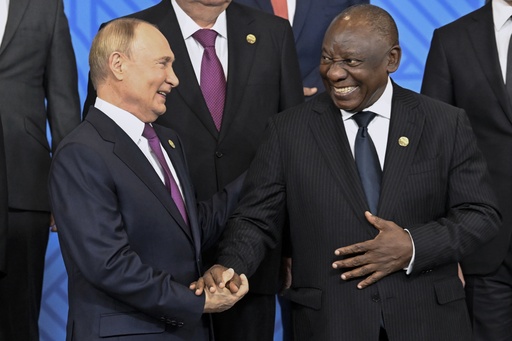
KAZAN, Russia — On Thursday, Russian President Vladimir Putin concluded a significant summit of the BRICS coalition, which consists of emerging economies, celebrating its function as a counterweight to Western influence.
The three-day assembly held in Kazan focused on enhancing financial collaboration, particularly the development of systems that could serve as alternatives to those dominated by Western platforms. Additionally, discussions included strategies for resolving regional disputes and plans for expanding the BRICS coalition.
Originally founded by Brazil, Russia, India, China, and South Africa, BRICS has grown to include Iran, Egypt, Ethiopia, the United Arab Emirates, and Saudi Arabia. Turkey, Azerbaijan, and Malaysia have formally submitted applications to join the bloc, while numerous other nations have expressed interest in membership.
During his address at the summit, which included representatives from potential member nations, Putin remarked that these countries “share similar aspirations and values and a vision of a new democratic global order.”
The event saw participation from 36 nations, illustrating the limited success of the U.S.-led attempts to isolate Russia in the wake of its actions in Ukraine. The Kremlin described this gathering as “the largest foreign policy event ever held” on its territory.
Russia has actively advocated for a new payment framework aimed at creating an alternative to the SWIFT global banking messaging system, facilitating trade with allied countries while circumventing Western sanctions.
In a joint statement released on Wednesday, attendees expressed their apprehensions regarding “the disruptive effect of unlawful unilateral coercive measures, including illegal sanctions” and reaffirmed their dedication to strengthening financial ties within BRICS. They recognized the advantages of establishing “faster, low-cost, more efficient, transparent, safe, and inclusive cross-border payment mechanisms built on minimizing trade barriers and ensuring non-discriminatory access.”
Chinese President Xi Jinping also highlighted the bloc’s importance in promoting global security. He pointed out that China and Brazil have proposed a peace initiative for Ukraine, seeking broader international endorsement for the plan, which Ukraine has already dismissed.
Putin and Xi had previously declared a “no-limits” partnership shortly before Russia’s invasion of Ukraine in 2022, and they met twice earlier in the year—first in Beijing in May and then at a Shanghai Cooperation Organization summit in Kazakhstan in July.
Cooperation between Russia and India has intensified, with New Delhi viewing Moscow as a longstanding ally from the Cold War era, even amid Russia’s strong bilateral ties with India’s chief rival, China. While Western allies have been urging India to play a more active role in encouraging Russia to cease hostilities in Ukraine, Indian Prime Minister Narendra Modi has refrained from condemning Russia, instead advocating for a peaceful resolution.
On the sidelines of the summit, Putin engaged in several bilateral discussions and was scheduled to meet with U.N. Secretary-General Antonio Guterres on Thursday. This marked Guterres’s first visit to Russia in over two years, and his trip to Kazan sparked strong reactions from Kyiv.
